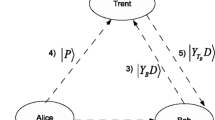Abstract
As a feasible model for signing quantum messages, some cryptanalysis and improvement of arbitrated quantum signature (AQS) have received a great deal of attentions in recent years. However, in this paper we find the previous improvement is not suitable implemented in some typical AQS protocols in the sense that the receiver, Bob, can forge a valid signature under known message attack. We describe the forgery strategy and present some corresponding improved strategies to stand against the forgery attack by modifying the encryption algorithm, an important part of AQS. These works preserve the merits of AQS and lead some potential improvements of the security in quantum signature or other cryptography problems.

Similar content being viewed by others
References
Shor, P.: Polynomial-time algorithms for prime factorization and discrete logarithms on a quantum computer. SIAM J. Comput. 26(5), 1484–1509 (1997)
Grover, L.K.: A Fast Quantum Mechanical Algorithm for, Database Search. quant-ph/9605043v3 (1996)
Gisin, N., Ribordy, G., Tittel, W., et al.: Quantum cryptography. Rev. Mod. Phys. 74, 145–195 (2002)
Bennett, C.H., Brassard, G.: Quantum cryptography. Public key distribution and coin tossing. In: Proceedings of the IEEE International Conference on Computers, Systems, and Signal Processing, pp. 175–179. IEEE Press, New York (1984)
Ekert, A.K.: Quantum cryptography based on bell theorem. Phys. Rev. Lett. 67, 661–663 (1991)
Bennett, C.H.: Quantum cryptography using any two nonorthogonal states. Phys. Rev. Lett. 68, 3121–3124 (1992)
Bennett, C.H., Brassard, G., et al.: Teleporting an unknown quantum state via dual classical and Einstein–Podolsky–Rosen channels. Phys. Rev. Lett. 70, 1895–1899 (1993)
Gao, F., Guo, F.Z., Wen, Q.Y., et al.: Quantum key distribution without alternative measurements and rotations. Phys. Lett. A 349, 53–58 (2006)
Cleve, R., Gottesman, D., Lo, H.K.: How to share a quantum secret. Phys. Rev. Lett. 83, 648–651 (1999)
Hillery, M., Buzĕk, V., Berthiaume, A.: Quantum secret sharing. Phys. Rev. A 59, 1829–1834 (1999)
Karlsson, A., Koashi, M., Imoto, N.: Quantum entanglement for secret sharing and secret splitting. Phys. Rev. A 59, 162–168 (1999)
Long, G.L., Liu, X.S.: Theoretically efficient high-capacity quantum-key-distribution scheme. Phys. Rev. A 65, 032302 (2002)
Deng, F.G., Long, G.L., Liu, X.S.: Two-step quantum direct communication protocol using the Einstein–Podolsky–Rosen pair block. Phys. Rev. A 68, 042317 (2003)
Lin, S., Wen, Q.Y., Zhu, F.C.: Quantum secure direct communication with X-type entangled states. Phys. Rev. A 78, 064304 (2008)
Gottesman, D., Chuang, I.: Quantum Digital Signatures. quant-ph/0105032v2 (2001)
Buhrman, H., Cleve, R., Watrous, J., et al.: Quantum fingerprinting. Phys. Rev. Lett. 87, 167902 (2001)
Buhrman, H., Crepeau, C., Gottesman, D., et al.: Authentication of Quantum Messages. IEEE Computer Society Press, Washington (2002)
Zeng, G.H., Keitel, C.H.: Arbitrated quantum-signature scheme. Phys. Rev. A 65, 042312 (2002)
Li, Q., Chan, W.H., Long, D.Y.: Arbitrated quantum signature scheme using Bell states. Phys. Rev. A. 79, 054307 (2009)
Zou, X.F., Qiu, D.W.: Security analysis and improvements of arbitrated quantum signature schemes. Phys. Rev. A 82, 042325 (2010)
Gao, F., Qin, S.J., Guo, F.Z., Wen, Q.Y.: Cryptanalysis of the arbitrated quantum signature protocols. Phys. Rev. A 84, 022344 (2011)
Choi, J.W., Chang, K.Y., Hong, D.: Security problem on arbitrated quantum signature schemes. Phys. Rev. A 84, 062330 (2011)
Boykin, P.O., Roychowdhury, V.: Optimal encryption of quantum bits. Phys. Rev. A 67, 042317 (2003)
Rains, E., et al.: Handbook of Coding Theory, 177C294 pp. math.CO/0208001 (1998)
Gao, F., Guo, F.Z., Wen, Q.Y., Zhu, F.C.: Comment on “Experimental Demonstration of a Quantum Protocol for Byzantine Agreement and Liar Detection”. Phys. Rev. Lett. 101, 208901 (2008)
Zhang, Y.S., Li, C.F., Guo, G.C.: Comment on “Quantum key distribution without alternative measurements”. Phys. Rev. A 63, 036301 (2001)
Gao, F., Qin, S.J., Wen, Q.Y., Zhu, F.C.: A simple participant attack on the Bradler–Dusek protocol. Quantum Inf. Comput. 7, 329 (2007)
Gao, F., Wen, Q.Y., Zhu, F.C.: Teleportation attack on the QSDC protocol with a random basis and order. Chin. Phys. B 17, 3189 (2008)
Gao, F., Qin, S.J., Guo, F.Z., Wen, Q.Y.: Dense-coding attack on three-party quantum key distribution protocols. IEEE J. Quantum Electron. 47, 630 (2011)
Qin, S.J., Gao, F., Wen, Q.Y., Zhu, F.C.: Improving the security of multiparty quantum secret sharing against an attack with a fake signal. Phys. Lett. A 357, 101 (2006)
W’ojcik, A.: Eavesdropping on the ping-pong quantum communication protocol. Phys. Rev. Lett. 90, 157901 (2003)
W’ojcik, A.: Comment on “Quantum dense key distribution”. Phys. Rev. A 71, 016301 (2005)
Cai, Q.Y.: The “Ping-Pong” protocol can be attacked without eavesdropping. Phys. Rev. Lett. 91, 109801 (2003)
Gao, F., Guo, F.Z., Wen, Q.Y., Zhu, F.C.: Consistency of shared reference frames should be reexamined. Phys. Rev. A 77, 014302 (2008)
Gao, F., Wen, Q.Y., Zhu, F.C.: Comment on: “Quantum exam”. Phys. Lett. A 360, 748 (2007)
Gao, F., Lin, S., Wen, Q.Y., Zhu, F.C.: A special eavesdropping on one-sender versus N-receiver QSDC protocol. Chin. Phys. Lett. 25, 1561 (2008)
Gao, F., Lin, S., Wen, Q.Y., Zhu, F.C.: Cryptanalysis of multiparty controlled quantum secure direct communication using Greenberger-Horne-Zeilinger state. Opt. Commun. 283, 192 (2010)
Gisin, N., Fasel, S., Kraus, B., Zbinden, H., Ribordy, G.: Trojan-horse attacks on quantum-key-distribution systems. Phys. Rev. A 73, 022320 (2006)
Deng, F.G., Li, X.H., Zhou, H.Y., Zhang, Z.J.: Improving the security of multiparty quantum secret sharing against Trojan horse attack. Phys. Rev. A 72, 044302 (2005)
Hwang, T., Luo, Y.P., Chong, S.K.: Comment on: “Security analysis and improvements of arbitrated quantum signature schemes”. Phys. Rev. A 85, 056301 (2012)
Acknowledgments
This work is supported by NSFC (Grant Nos. 61170270, 61100203, 61272057, 61202434, 61003286, 61121061), NCET (Grant No. NCET-10-0260), Beijing Natural Science Foundation (Grant Nos. 4112040, 4122054), the Fundamental Research Funds for the Central Universities (Grant Nos. 2011YB01, 2012RC0612).
Author information
Authors and Affiliations
Corresponding author
Rights and permissions
About this article
Cite this article
Zhang, KJ., Zhang, WW. & Li, D. Improving the security of arbitrated quantum signature against the forgery attack. Quantum Inf Process 12, 2655–2669 (2013). https://doi.org/10.1007/s11128-013-0554-4
Received:
Accepted:
Published:
Issue Date:
DOI: https://doi.org/10.1007/s11128-013-0554-4




